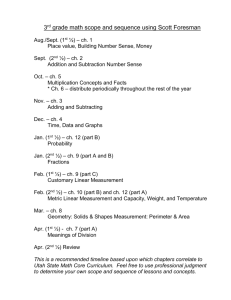1302. Syllabus.Spr.2012.doc
advertisement
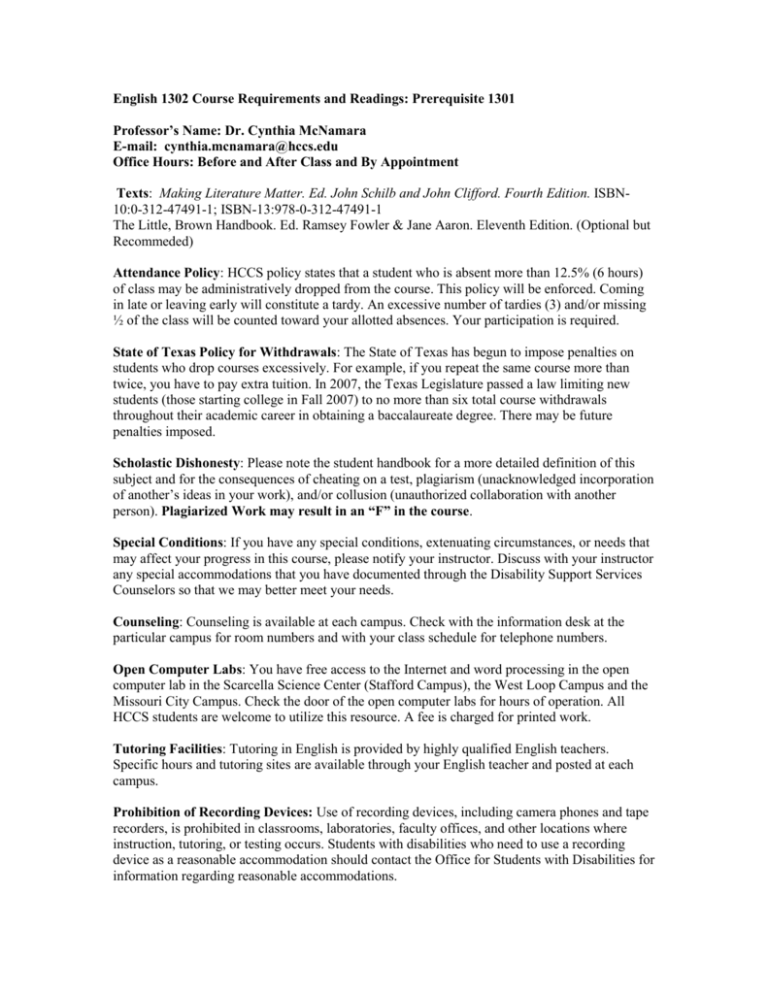
English 1302 Course Requirements and Readings: Prerequisite 1301 Professor’s Name: Dr. Cynthia McNamara E-mail: cynthia.mcnamara@hccs.edu Office Hours: Before and After Class and By Appointment Texts: Making Literature Matter. Ed. John Schilb and John Clifford. Fourth Edition. ISBN10:0-312-47491-1; ISBN-13:978-0-312-47491-1 The Little, Brown Handbook. Ed. Ramsey Fowler & Jane Aaron. Eleventh Edition. (Optional but Recommeded) Attendance Policy: HCCS policy states that a student who is absent more than 12.5% (6 hours) of class may be administratively dropped from the course. This policy will be enforced. Coming in late or leaving early will constitute a tardy. An excessive number of tardies (3) and/or missing ½ of the class will be counted toward your allotted absences. Your participation is required. State of Texas Policy for Withdrawals: The State of Texas has begun to impose penalties on students who drop courses excessively. For example, if you repeat the same course more than twice, you have to pay extra tuition. In 2007, the Texas Legislature passed a law limiting new students (those starting college in Fall 2007) to no more than six total course withdrawals throughout their academic career in obtaining a baccalaureate degree. There may be future penalties imposed. Scholastic Dishonesty: Please note the student handbook for a more detailed definition of this subject and for the consequences of cheating on a test, plagiarism (unacknowledged incorporation of another’s ideas in your work), and/or collusion (unauthorized collaboration with another person). Plagiarized Work may result in an “F” in the course. Special Conditions: If you have any special conditions, extenuating circumstances, or needs that may affect your progress in this course, please notify your instructor. Discuss with your instructor any special accommodations that you have documented through the Disability Support Services Counselors so that we may better meet your needs. Counseling: Counseling is available at each campus. Check with the information desk at the particular campus for room numbers and with your class schedule for telephone numbers. Open Computer Labs: You have free access to the Internet and word processing in the open computer lab in the Scarcella Science Center (Stafford Campus), the West Loop Campus and the Missouri City Campus. Check the door of the open computer labs for hours of operation. All HCCS students are welcome to utilize this resource. A fee is charged for printed work. Tutoring Facilities: Tutoring in English is provided by highly qualified English teachers. Specific hours and tutoring sites are available through your English teacher and posted at each campus. Prohibition of Recording Devices: Use of recording devices, including camera phones and tape recorders, is prohibited in classrooms, laboratories, faculty offices, and other locations where instruction, tutoring, or testing occurs. Students with disabilities who need to use a recording device as a reasonable accommodation should contact the Office for Students with Disabilities for information regarding reasonable accommodations. 2 Faculty Evaluation Survey: At Houston Community College, professors believe that thoughtful student feedback is necessary to improve teaching and learning. During a designated time, you will be asked to answer a short online survey of research-based questions related to instruction. The anonymous results of the survey will be made available to your professors and division chairs for continual improvement of instruction. Look for the survey as part of the Houston Community College Student System online near the end of the term. Grade Turnaround: The English department regards a two- week turnaround for the return of major essays an appropriate time frame. Late Paper Policy: Papers that are late will be penalized 5 points for the first class within the week. Those late over a weekend will be penalized 15 points. Thereafter, penalty will be 20 points per class. There will be a cutoff date when no late paper will be accepted. That date is at the discretion of the Professor. There are no exceptions to this policy. Important Dates: February 20 Presidents' Day Holiday March 12-18 Spring Break March 29 Last Day for Administrative/Student Withdrawals—4:30 pm April 6-8 Spring Holiday May 6 Last Day of Instruction May 7-13 Final Examinations The following objectives are to ensure basic intellectual competencies in this course: Reading: Reading material at the college level means having the ability to analyze and interpret a variety of printed materials. Writing: Writing at the college level means having the ability to produce clear, correct, and coherent prose adapted to purpose, occasion, and audience. In addition to knowing correct grammar, spelling, and punctuation, students should also become familiar with the writing process, including how to discover a topic, how to develop and organize it, and how to phrase it effectively for their audience. Speaking: Effective speaking is the ability to communicate orally in clear, coherent, and persuasive language appropriate to purpose, occasion, and audience Listening: Listening at the college level means the ability to analyze and interpret various forms of spoken communication. Critical Thinking: Critical thinking embraces methods for applying skills analytically and creatively to subject matter in order to evaluate arguments and to construct alternative strategies. Problem solving is one of the applications of critical thinking used to address an identified task. Computer Literacy: Computer literacy at the college level means having the ability to use computer-based technology in communicating, solving problems, and acquiring information. Student Learning Outcomes for English 1302 Apply basic principles of Rhetorical Analysis. Write essays that classify, explain, and evaluate rhetorical and literary strategies employed in argument, persuasion, and various forms of literature. Identify, differentiate, integrate, and synthesize research materials into argumentative and/or analytical essays. Employ appropriate documentation style and format across the spectrum of in-class and out-ofclass written discourse. 3 Grade Percentages: Essays 80% All essays will be counted equally. Professor’s Choice (journals, daily tests, oral reports, group work): 10% Final Exam In-Class: 10% éALL REQUIREMENTS MUST BE FULFILLED TO PASS THIS COURSE. *All drafts of the essay assignments must be word-processed or typed. This syllabus is subject to changes. Readings Week 1: Jan. 17-19 Introduction to the Course Diagnostic Essay Week 2: Jan. 23-16 Kate Chopin "The Story of an Hour" 659 Kate Chopin "Desirées Baby" 661 Week 3: Jan. 30-Feb.2 Shirley Jackson "The Lottery" 837 Ernest Hemingway "Hills Like White Elephants" 523 Week 4: Feb. 6-9 Nathaniel Hawthorne "Young Goodman Brown" 1137 Eudora Welty "A Worn Path" 1349 Week 5: Feb. 13-16 Mark Doty "Night Ferry" 1595 Bobbie Ann Mason "Shiloh" 1448 Week 6: Feb. 21-23 (Feb. 20 President's Day) Complete Mason Week 7: Feb. 27Robert Hayden “Those Winter Sundays” 255 William Stafford “Traveling Through the Dark” 1519 Week 8: Mar. 5-8 Mary Oliver “Singapore” 129 Yusef Komunyakaa “Blackberries” 130 Edwin Arlington Robinson “The Mill” 131 Week 9: Mar. 19-22 Yevgeny Yevtushenko "Babii Yar" 1014 Jeremy Rifkin "The Empathetic Civilisation" Week 10: Mar. 26-2 Tennessee Williams The Glass Managerie 343-392 4 Week 11: Apr. 2-5 Williams Week 12: Apr. 9-12 Willaims Week 13: Apr. 16-19 Complete Willaims Diane Ackerman "Orpheus and Eurydice" 613 Week 14: Apr. 23-26 Complete Ackerman Week 15: Apr. 30-May 3 Preparation for Final Exam Week 16: May 7-10 Final Exams
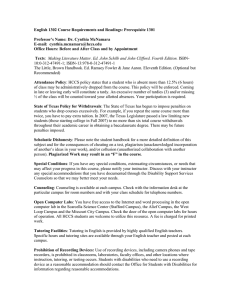
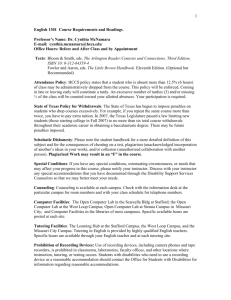
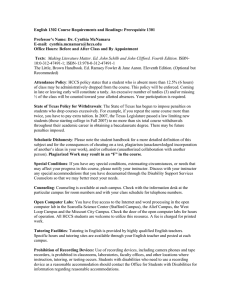
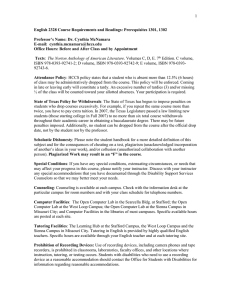
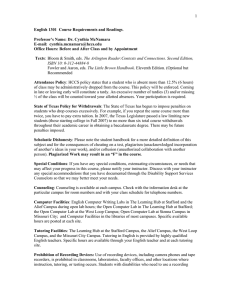
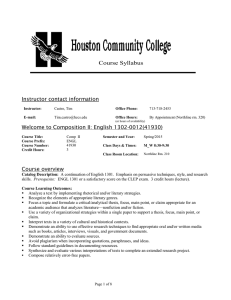

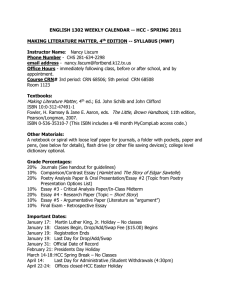

![E1302 MLM departmental sample TR version Fall08[1].doc](http://s2.studylib.net/store/data/015251183_1-4e4f37b9512df9b8bb1831a39813fe56-300x300.png)

